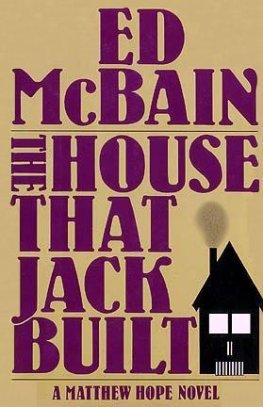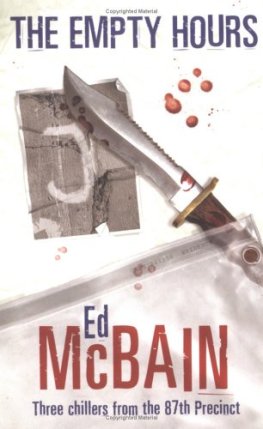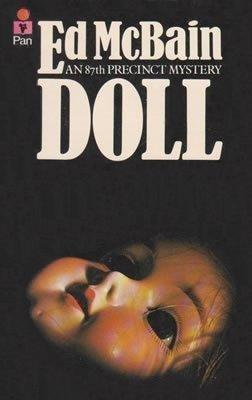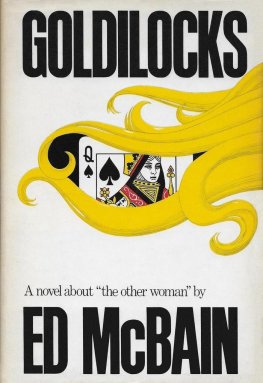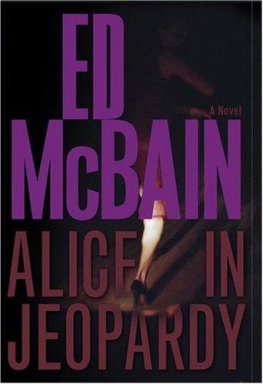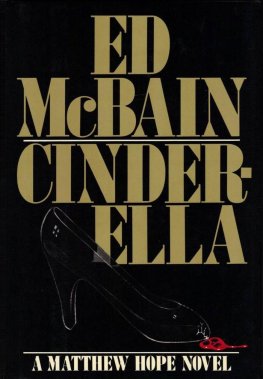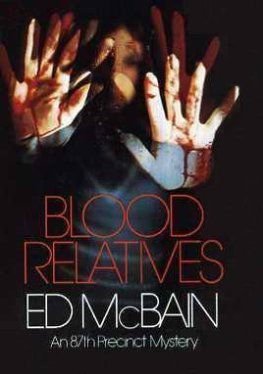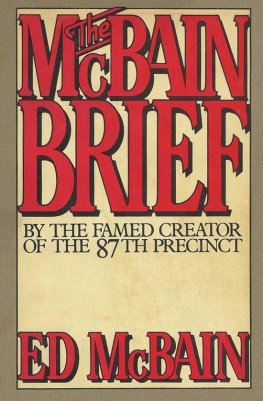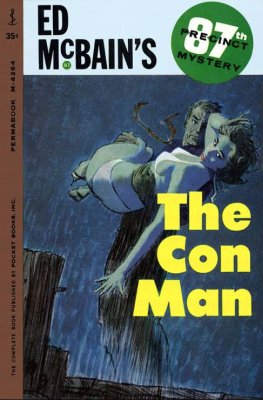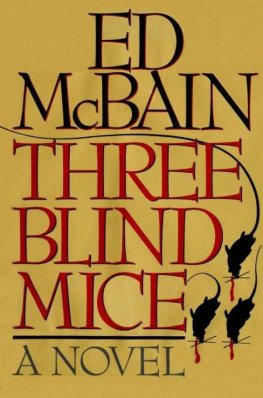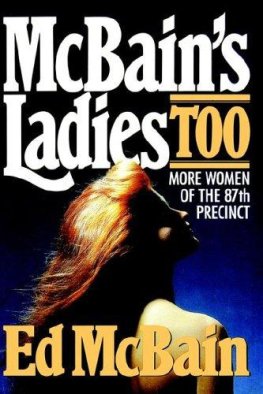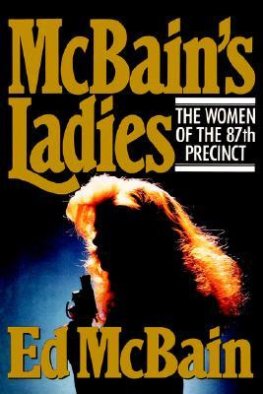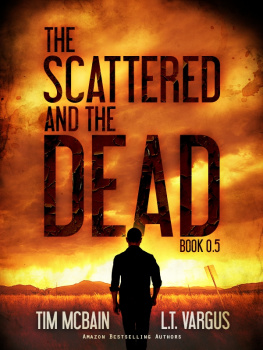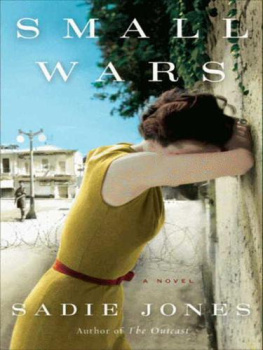Ed McBain - Sadie When She Died
Here you can read online Ed McBain - Sadie When She Died full text of the book (entire story) in english for free. Download pdf and epub, get meaning, cover and reviews about this ebook. genre: Detective and thriller. Description of the work, (preface) as well as reviews are available. Best literature library LitArk.com created for fans of good reading and offers a wide selection of genres:
Romance novel
Science fiction
Adventure
Detective
Science
History
Home and family
Prose
Art
Politics
Computer
Non-fiction
Religion
Business
Children
Humor
Choose a favorite category and find really read worthwhile books. Enjoy immersion in the world of imagination, feel the emotions of the characters or learn something new for yourself, make an fascinating discovery.

- Book:Sadie When She Died
- Author:
- Genre:
- Rating:5 / 5
- Favourites:Add to favourites
- Your mark:
- 100
- 1
- 2
- 3
- 4
- 5
Sadie When She Died: summary, description and annotation
We offer to read an annotation, description, summary or preface (depends on what the author of the book "Sadie When She Died" wrote himself). If you haven't found the necessary information about the book — write in the comments, we will try to find it.
Sadie When She Died — read online for free the complete book (whole text) full work
Below is the text of the book, divided by pages. System saving the place of the last page read, allows you to conveniently read the book "Sadie When She Died" online for free, without having to search again every time where you left off. Put a bookmark, and you can go to the page where you finished reading at any time.
Font size:
Interval:
Bookmark:
1
Detective Steve Carella wasnt sure he had heard the man correctly. This was not what a bereaved husband was supposed to say when his wife lay disemboweled on the bedroom floor in a pool of her own blood. The man was still wearing overcoat and homburg, muffler and gloves. He stood near the telephone on the night table, a tall man with a narrow face, the vertical plane of which was dramatically broken by a well-groomed gray mustache that matched the graying hair at his temples. His eyes were clear and blue and distinctly free of pain or grief. As if to make certain Carella had understood him, he repeated a fragment of his earlier statement, giving it even more emphasis this time around.
Very glad shes dead, he said.
Sir, Carella said, Im sure I dont have to tell you . . .
Thats right, the man said, you dont have to tell me. It happens Im a criminal lawyer. I am well aware of my rights, and fully cognizant of the fact that anything I tell you of my own free will may later be used against me. I repeat that my wife was a no-good bitch, and Im delighted someone killed her.
Carella nodded, opened his pad, glanced at it, and said, Are you the man who notified the police?
I am.
Then your name is Gerald Fletcher.
Thats correct.
Your wifes name, Mr. Fletcher?
Sarah. Sarah Fletcher.
Want to tell me what happened?
I got home about fifteen minutes ago. I called to my wife from the front door, and got no answer. I came here into the bedroom and found her dead on the floor. I immediately called the police.
Was the room in this condition when you came in?
It was.
Touch anything?
Nothing. I havent moved from this spot since I placed the call.
Anybody in here when you came in?
Not a soul. Except my wife, of course.
And you say you got home about fifteen minutes ago?
More or less. You can check it with the elevator operator who took me up.
Carella looked at his watch. That would have been ten-thirty or thereabouts.
Yes.
And you called the police at . . . Carella consulted the open notebook. Ten thirty-four. Is that right?
I didnt look at my watch, but I expect thats close enough.
Well, the call was logged at . . .
Ten thirty-four is close enough.
Is that your suitcase in the entrance hallway?
It is.
Just returning home from a trip?
I was on the Coast for three days.
Where?
Los Angeles.
Doing what?
An associate of mine needed advice on a brief hes preparing.
What time did your plane get in?
Nine forty-five. I claimed my bag, caught a taxi, and came directly home.
And got here about ten-thirty, right?
Thats right. For the third time.
Sir?
Youve already ascertained the fact three times. If there remains any doubt in your mind, let me reiterate that I got here at ten-thirty, found my wife dead, and called the police at ten thirty-four.
Yes, sir, Ive got that.
Whats your name? Fletcher asked suddenly.
Carella. Detective Steve Carella.
Ill remember that.
Please do.
While Fletcher was remembering Carellas name; and while the police photographer was doing his macabre little jig around the body, flashbulbs popping, death being recorded on Polaroid film for instant verification, pull, wait fifteen seconds, beep, rip, examine the picture to make sure the lady looks good in the rushes, or as good as any lady can look with her belly wide open and her intestines spilling onto a rug; and while two Homicide cops named Monoghan and Monroe beefed about being called away from their homes on a cold night in December, two weeks before Christmas; and while Detective Bert Kling was downstairs talking to the elevator operator and the doorman in an attempt to ascertain the exact hour Mr. Gerald Fletcher had pulled up in a taxicab and entered the apartment building on Silvermine Oval and gone up in the elevator to find his once-beautiful wife, Sarah, spread amoeba-like in ugly death on the bedroom rug; while all this was happening, a laboratory technician named Marshall Davies was in the kitchen of the apartment, occupying himself with busy work while he waited for the Medical Examiner to pronounce the lady dead and state the probable cause (as if it took a genius to determine that someone had ripped her open with a switchblade knife), at which time Davies would go into the bedroom and with delicate care remove the knife protruding from the blood and slime of the ladys guts in an attempt to salvage some good latent prints from the handle of the murder weapon.
Davies was a new technician, but an observant one, and the first thing he noticed in the kitchen was that the window was wide open, not exactly usual for a December night when the temperature outside hovered at twelve degrees Fahrenheit, not to mention Centigrade. Davies leaned over the sink and further noticed that the window opened onto a fire escape on the rear of the building. Whereas he was paid only to examine the superficial aspects of any criminal actsuch as glass shards in a victims eyeball, or shotgun pellets in the chest, or, as in the case of the lady in the other room, a knife in the bellyhe could not resist speculating that perhaps someone, some intruder, had climbed up the fire escape and into the kitchen, after which he had proceeded to the bedroom, where hed done the lady in.
Since there was a big muddy footprint in the kitchen sink and another one on the floor near the sink, and several others fading in intensity as they traveled inexorably across the waxed kitchen floor to the door that led to the living room, Davies surmised he was onto something hot. Wasnt it entirely possible that an intruder had climbed over the windowsill and into the sink and walked across the room, bearing the switchblade knife that had later been pulled viciously across the ladys belly from left to right, like a rip-top cellophane tab, opening her as effortlessly as it would have a package of cigarettes?
Davies stopped speculating, and photographed the footprint in the sink and the ones on the floor. Then, because the Assistant M.E. was still fussing around with the corpse (Death by stab wound, Davies thought impatiently; evisceration, for Christs sake!) and seemed reluctant to commit himself without perhaps first calling his superior officer or his mother (Say, weve got a tough one here, ladys belly ripped open with a knife, got any idea what might have caused death?), Davies climbed out onto the fire escape and dusted the lower edge of the window, which the intruder would have had to grab in order to open the window, and then for good measure dusted the iron railings of the ladder leading up to the fire escape.
Now, if the M.E. ever got through with the goddamn body, and if there were any latent prints on the handle of the knife, the boys of the 87th would be halfway home, thanks to Marshall Davies.
He felt pretty good.
Detective Bert Kling felt pretty lousy.
His condition, he kept telling himself, had nothing to do with the fact that Cindy Forrest had broken their engagement three weeks before. To begin with, it had never been a proper engagement, and a person certainly couldnt go around mourning something that had never truly existed. Besides, Cindy had made it abundantly clear that, whereas they had enjoyed some very good times together, and whereas she would always think upon him fondly and recall with great pleasure the days and months (yea, even years) they had spent together pretending they were in love, she had nonetheless met a very attractive young man who was a practicing psychiatrist at Buenavista Hospital, where she was doing her internship, and seeing as how they shared identical interests, and seeing as how he was quite ready to get married whereas Kling seemed to be married to a .38 Detectives Special, a scarred wooden desk, and a detention cage, Cindy felt it might be best to terminate their relationship immediately rather than court the possibility of trauma induced by slow and painful withdrawal.
Next pageFont size:
Interval:
Bookmark:
Similar books «Sadie When She Died»
Look at similar books to Sadie When She Died. We have selected literature similar in name and meaning in the hope of providing readers with more options to find new, interesting, not yet read works.
Discussion, reviews of the book Sadie When She Died and just readers' own opinions. Leave your comments, write what you think about the work, its meaning or the main characters. Specify what exactly you liked and what you didn't like, and why you think so.

